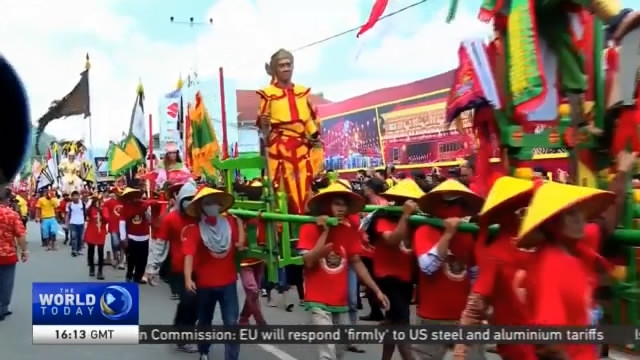
09:04, 03-Mar-2018
Cap Go Meh Festival: Indonesia celebrates end of Chinese New Year

Indonesians have been celebrating the end of Chinese New Year. It's one of the largest festivals in the country. Hundreds of thousands gather to watch the parade that blends Indonesian and Chinese cultures. CGTN's Silkina Ahluwalia has more Indonesia.
This is one of Indonesia's most vibrant festivals. Hundreds of thousands of people gather each year in Singkawang, West Kalimantan to welcome the 15th day of the Chinese New Year. Globally, the celebration is known as Cap Go Meh. And in Singkawang, they do it bigger and better than anywhere else in Indonesia. The ritual begins the day before the festival. Participants of the parade become a part of an important ceremony of clearing the streets.
TJHAI LEONARDI HEAD OF ORGANIZING COMMITTEE "This year's festival is very different from previous years. We have one thousand and thirty-eight participants in the parade, setting a new world record. This festival is also important to the town of Singkawang because it helps to boost the economy."
Singkawang is a small town where ethnic Chinese communities have resided for centuries. It's rich in cultures that date back from ancient China. And those elements are always showcased in the lively parade.
SILKINA AHLUWALIA WEST KALIMANTAN, INDONESIA "But what makes this celebration all the more special is this main attraction. This is why so many people from all round the world come to the parade. This ritual has become an essential part of the Cap Go Meh festival here in Singkawang."
These men are called Tatungs. This year, more than 1000 of them paraded around the streets. The word Tatung comes from the Hakka language, meaning a person who is possessed by gods or the spirits of ancestors. This particular act is a symbol to fend off misfortune.
"As an Indonesian, I think this festival is very important in celebrating diversity. I've always been interested in Chinese culture and I'm happy we get to celebrate both Indonesian and Chinese culture today."
Aside from putting Singkawang on the spotlight, this festival celebrates both Indonesian and Chinese cultures, promoting harmony and diversity in Indonesia. Silkina Ahluwalia, CGTN, West Kalimantan, Indonesia.

SITEMAP
Copyright © 2018 CGTN. Beijing ICP prepared NO.16065310-3
Copyright © 2018 CGTN. Beijing ICP prepared NO.16065310-3